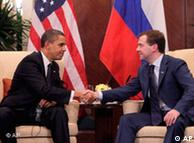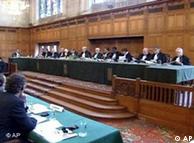Deutsche Velle, Analysis
Great powers playing politics with Kosovo and Georgia The impact of the ICJ's decision regarding Kosovo's 2008 declaration of independence has become a matter of perception rather than objective truth. The West as well as Georgia consider Kosovo to be an unusual case. Slobodan Milosevic's regime committed ethnic cleansing against the Kosovar Albanians, thereby sacrificing any legitimate claim Serbia may have had to governing Kosovo. But Russia, Abkhazia and South Ossetia see Kosovo as a precedent.
"The territorially damaged states [Georgia] see Kosovo as an exception," Uwe Halbach, an expert on the Caucasus with the German Institute for International and Security Affairs, told Deutsche Welle. "On the side of the de-facto states [Abkhazia, South Ossetia] it is always highlighted that the decision on the declaration of independence emphasizes the right to self-determination above territorial sovereignty."
Principles call for consistency. Yet the respective positions of Russia and the US appear to be based more on their own political agendas than a belief in self-determination or state sovereignty rooted in international law. The US can support independence in Kosovo while opposing it in Abkhazia and South Ossetia. Meanwhile, Russia can support independence in Abkhazia and South Ossetia, while opposing it in Kosovo.
"International law itself is indifferent," Halbach said. "International law doesn't support secession, but it's also not against it. In the end politics is decisive."
The politics of great powers
During the Kosovo conflict, Russia viewed itself as the historic guardian of Serbian interests against an expansionist West. However, once NATO mobilized militarily against Belgrade, there was very little Russia could do to stop a Western-backed secession of Kosovo from Serbia. Moscow felt sidelined and not taken seriously as a great power.
So after Kosovo declared its independence in 2008, Russia adopted the case as a precedent. And it applied this precedent in Georgia under the pretence of maintaining stability in the South Caucasus, as the West had done in Kosovo nearly 10 years prior..
 : Relations between great powers still decide the fate of nations"
: Relations between great powers still decide the fate of nations"

No comments:
Post a Comment